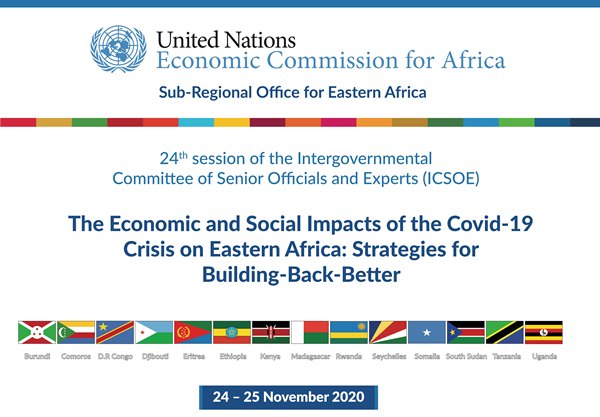
Policymakers from 14 countries of Eastern Africa kicked off their regional meeting known as 24th Meeting of the Intergovernmental Committee of Senior Officials and Experts (ICSOE) this Tuesday with a call to chart a way forward as Covid-19 pandemic compelled this year’s gathering to be virtual.
The two-day meeting was convened by the UN Economic Commission for Africa (ECA), through its office for Eastern Africa under the theme: Economic and Social Impacts of the Covid-19 Crisis on Eastern Africa: Strategies for Building-Back-Better.
Ms Mama Keita, Director of ECA in Eastern Africa explained that senior officials and experts come together annually to discuss the progress, opportunities and challenges of their region in order to chart jointly a way forward and foster structural transformation and sustainable development.
Speaking at the opening of the meeting, Mr Osman Saleh, Minister of Foreign Affairs of the State of Eritrea commended ECA for organizing the e-gathering, saying that the pandemic has become the biggest challenge of recent times confronting the ideals of humanity.
Minister Saleh said that in Eastern Africa, the pandemic has been coupled with locust invasion and flooding with significant effect to development and people’s livelihood.
“Nevertheless, countries in our region were among the very first countries to take aggressive measures against COVID-19 through mandatory quarantine and have tackled the pandemic and its effects by mobilizing national capacities and stimulus packages wherever possible, in the interest of social protection and macro-economic recovery” stressed the Minister.
The pandemic, which has claimed close to 1.4 million lives worldwide, has also caused significant social and economic distress as most of the income-generating activities were shut down to save human lives.
“Looking at the medium and long-term horizon of the COVID-19 pandemic, it is important to discuss opportunities, interventions and priorities touching on post-COVID-19 recovery phase to build resilience and sustainability”, said the East Africa’ Community Secretary General, Amb. Liberat Mfumukeko .
Mfumukeko added that policymakers have learnt that strong multisectoral approach with a strong coordination mechanism is important for the success of the regional response.
The need for resilient economies
The African Development Bank (AfDB) Group’s Acting Director-General, Ms Nnenna Nwabufo, who stressed also the importance of regional coordination and collaboration to contain cross border transmissions and to strengthen surveillance systems in her address.
She further emphasized the need to improve Africa’s business environment to facilitate the participation of local and foreign private sector as well as investors to accelerate Africa’s industrialization and integration process and create the needed jobs for the growing young people on the continent. “This will strengthen Africa’s resilience and bring the trajectory of our economies back better and faster”
The Secretary-General of the Indian Ocean Commission (IOC), Mr Vêlayoudom Marimoutou, and a Representative of the African Capacity Building Foundation (ACBF) joined the discussion of the first day of the meeting. They respectively stressed the need to diversify the economies for more resilience, and the need to pay particular attention to capacity gaps in the process of building back better our economies.
Participants at the virtual meeting include Representatives of Youth and women groups, from Regional Economic Communities, civil society, private sector associations, academia and media.
Government officials from the following 14 countries are also attending: Burundi, Comores, RD Congo, Djibouti, Eritrea, Ethiopia, Kenya, Madagascar, Rwanda, Seychelles, Somalia, South Sudan, Tanzania and Uganda. (End)
